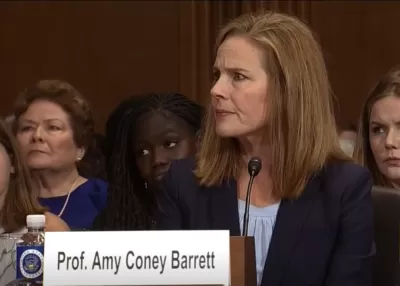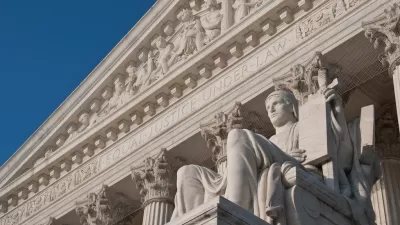A month ago, Barrett dismissed a challenge to Chicago's deal with the Obama Center by rejecting a very expansive claim of a "taking" under the 5th Amendment and by showing great deference to the city.

Amy Coney Barrett, President Trump’s nominee to replace Ruth Bader Ginsburg on the U.S. Supreme Court, has a thin judicial record on property and environmental issues. Environmental group are excoriating Barrett as a threat to all efforts at environmental protection, particularly combatting climate change. And many environmentalists are concerned that by reducing the number of liberal justices on the high court to three, public-interest-oriented cases in the environmental and property arenas won’t even get a hearing in front of the Supreme Court because it takes four votes to hear a case.
To be sure, Barrett’s confirmation would pull the court in a conservative direction on property and environmental issues. Recently she joined a majority of the Seventh U.S. Circuit Court of Appeals in rejecting the argument that wetlands surrounded by residential development, 11 miles from the nearest navigable waterway, required a federal permit, as the Army Corps of Engineers argued. But she did not write the ruling.
And In the one environmental/property opinion she has written as a member of the Seventh Circuit – issued only a month ago – Barrett rejected a very expansive federal takings claim and showed extreme deference to the City of Chicago. She also showed herself to be extremely careful in her legal reasoning and an unusually clear and accessible writer of judicial opinions.
FULL STORY: Barrett's Only Property Rights Ruling: Careful, Narrow, Deferential

Maui's Vacation Rental Debate Turns Ugly
Verbal attacks, misinformation campaigns and fistfights plague a high-stakes debate to convert thousands of vacation rentals into long-term housing.

Planetizen Federal Action Tracker
A weekly monitor of how Trump’s orders and actions are impacting planners and planning in America.

San Francisco Suspends Traffic Calming Amidst Record Deaths
Citing “a challenging fiscal landscape,” the city will cease the program on the heels of 42 traffic deaths, including 24 pedestrians.

Adaptive Reuse Will Create Housing in a Suburban Texas Strip Mall
A developer is reimagining a strip mall property as a mixed-use complex with housing and retail.

Study: Anti-Homelessness Laws Don’t Work
Research shows that punitive measures that criminalized unhoused people don’t help reduce homelessness.

In U.S., Urban Gondolas Face Uphill Battle
Cities in Latin America and Europe have embraced aerial transitways — AKA gondolas — as sustainable, convenient urban transport, especially in tricky geographies. American cities have yet to catch up.
Urban Design for Planners 1: Software Tools
This six-course series explores essential urban design concepts using open source software and equips planners with the tools they need to participate fully in the urban design process.
Planning for Universal Design
Learn the tools for implementing Universal Design in planning regulations.
Heyer Gruel & Associates PA
JM Goldson LLC
Custer County Colorado
City of Camden Redevelopment Agency
City of Astoria
Transportation Research & Education Center (TREC) at Portland State University
Jefferson Parish Government
Camden Redevelopment Agency
City of Claremont





























